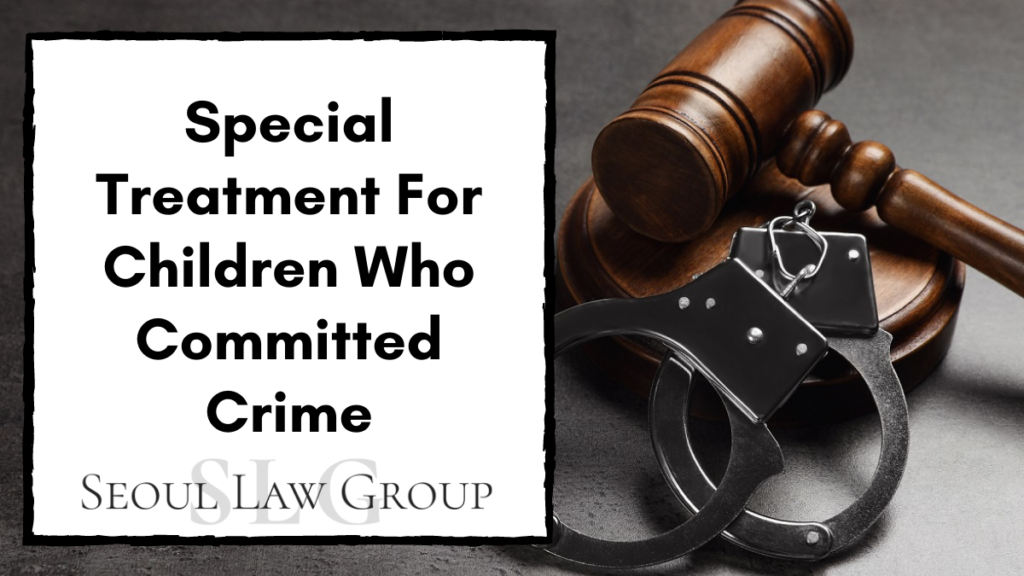Criminal Minors: Special Treatment for Children Who Committed Crime in Korea
When the child is under fourteen years old, they cannot be punished at all, whatever crime they committed. This is why the children under fourteen years (international age) old are called “criminal minors.”

Table of Contents
Criminal Minors in Korea
Criminal Act, Article 9 (Criminal Minors)
The act of a person under fourteen years of age shall not be punished.
1. 10 Years or Older but Still Under 14
But still, these children would need some guidance for their behavior. So, when a child, who is ten years old or more but still under fourteen years old, committed a crime, they are sent to the Juvenile Department for special trial. After being tried in the Juvenile Department, they are ordered to go through “protective detention” instead of “punishment.” You might wonder what an earth “protective detention” is, but we’ll look over that later in a different article.
2. 14 Years or Older but Still Under 19
When the child reaches fourteen, they are no longer “criminal minors,” which means now they can be punished for their crime. But they are also under the jurisdiction of Juvenile Department until they reach nineteen. So, when a child, who is fourteen years old or more but still under nineteen years old, committed a crime, they can be sent to the criminal court as a defendant, while they can also be sent to the Juvenile Department. Whether they would be sent to the criminal court or the Juvenile Department depends on various factors. What kind of crime they committed? Is this their first time or they had been sent here several times already? Are they showing remorse and willing to change their behavior? Etc.
Juvenile Special Treatment
But even if they get officially charged and sent to the criminal court as a defendant, they still get some special treatment for their young age.
1. Death Sentence or Prison
First, defendants under eighteen years old can never be sentenced to death, nor be sentenced to life in prison. When their crime is severe enough to deserve death penalty or life sentence, they would be sentenced to fifteen years in prison instead.
Juvenile Act, Article 59 (Mitigation of Death Penalty and Life Sentence)
Death penalty or life sentence to a juvenile who was less than 18 years old when the crime was committed, shall be reduced to 15 years of imprisonment.
2. Reduced Punishment
Second, when the defendant is under nineteen years old, their punishment can be reduced. The law provides a variety of reasons for reducing punishments (e. g. when an intended crime is not completed, or when the criminal turns themselves in to the police, etc.), and “the defendant being under nineteen years old” is one of the reasons for those reduction.
Please note that this reduction is not obligatory, but optional. It happens only when the judge considers that it’s reasonable to reduce the punishment. If the judge decides to NOT reduce the punishment even though the defendant is under nineteen years old, then that’s too bad.
Juvenile Act, Article 60 (Indeterminate Sentence)
-
-
- The sentence may be reduced when, considering the special character of the juvenile, such a reduction is deemed reasonable.
-
3. Indeterminate Sentence
Third, when the defendant is under nineteen years old, and the punishment is more than two years in prison, the judge should sentence them with “indeterminate sentence.” This means that the sentence would be like “maximum three years, minimum one year in prison” or “maximum five years, minimum three years in prison,” so that if the child behaves well enough in prison, they can be released only after serving the minimum amount of sentence.
Juvenile Act, Article 60 (Indeterminate Sentence)
-
-
- Where a juvenile commits a crime punishable by imprisonment of a limited term of two or more years, a sentence shall specify the maximum and minimum terms within the scope of such term of punishment: Provided, That the maximum term shall not exceed ten years, and the minimum term shall not exceed five years.
-
All these special treatments only apply when the defendant is still underage when they are being sentenced in the court. So, if the child committed a crime when they were eighteen, but time had passed during the trial and now they are nineteen, they would be sentenced as an adult without any special treatment.
